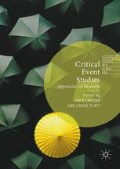Abstract
The study of events as a specific field of academic inquiry is relatively young. Degree programmes within the field in much of the Anglophone world tend to focus on operational considerations associated with the project management of delivering a range of events. Consequently events are frequently located in a matrix of two dominant dimension; these can be summarised as one of scale and the other of content. Scale encompasses small, highly localised activities with a small geographic reach, to mega-events that mobilise substantial media resources and target a global audience. Content is commonly broken down into a typology of events; there are many variations on the articulation of events typological models—most can be summarised under the headings of sport, cultural, and business. However, that construal of events is being criticised more and more, whilst a neo-liberal agenda that attempts to managerialise and depoliticise de-politicised event typologies is being challenged.
Access this chapter
Tax calculation will be finalised at checkout
Purchases are for personal use only
References
Andrews, H. & Leopold, T. (2013). Events and the social sciences. Oxon: Routledge.
Daspher, K., Fletcher, T., & McCullough, N. (2014). Sport events, society and culture. Oxon: Routledge.
Elias, N. (1978). What is sociology? London: Hutchinson University Library.
Elias, N. (1987). Involvement and detachment. Oxford: Blackwell.
Getz, D. (2007). Event studies: Theory, research and policy for planned events. London: Routledge.
Leibing, A. & McLean, A. (2007). Learn to value your shadow!: An introduction to the margins of fieldwork. In A. McLean & A. Leibing (Eds.), The shadow side of fieldwork: Exploring the blurred borders between ethnography and life (pp. 1–28). Malden, Oxford & Victoria: Blackwell Publishing.
Matthews, D. (2012). The analysis of historical spectacle and its potential impact on event studies. International Journal of Event Management Research, 7, 1–25.
Montesano Montessori, N. & Morales Lopez, E. (2015). Multimodal narrative as an instrument for social change. Reinventing democracy in Spain: The case of 15 M. CADAAD, 7(2), 200–221.
Reisigl, M. & Wodak, R. (2001). The discourse-historical approach (DHA). In R. Wodak & M. Meyer (Eds.), Methods of critical discourse studies (pp. 23–62). London: Sage.
Rojek, C. (2013). Event power: How global events manage and manipulate. London: Sage.
Author information
Authors and Affiliations
Editor information
Editors and Affiliations
Copyright information
© 2016 The Author(s)
About this chapter
Cite this chapter
Lamond, I.R., Platt, L. (2016). Introduction. In: R Lamond, I., Platt, L. (eds) Critical Event Studies. Leisure Studies in a Global Era. Palgrave Macmillan, London. https://doi.org/10.1057/978-1-137-52386-0_1
Download citation
DOI: https://doi.org/10.1057/978-1-137-52386-0_1
Published:
Publisher Name: Palgrave Macmillan, London
Print ISBN: 978-1-137-52384-6
Online ISBN: 978-1-137-52386-0
eBook Packages: Social SciencesSocial Sciences (R0)

